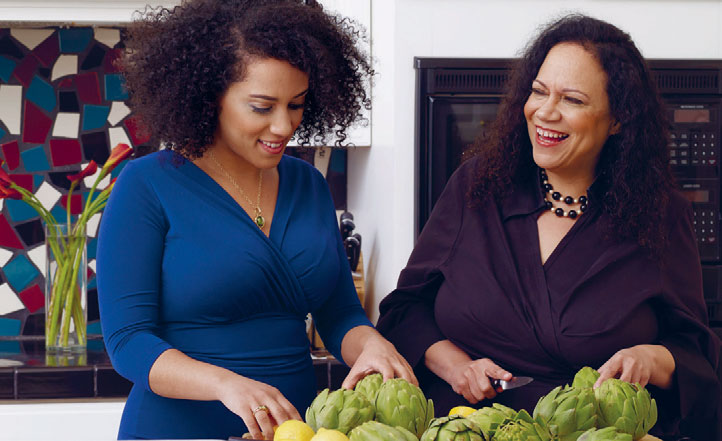
Author and Vanderbilt professor Alice Randall and daughter Caroline Randall Williams are rethinking their culture’s foodways with traditional dishes lower in fat and calories.
Diddy Wah Diddy—author Alice Randall, writer-in-residence at Vanderbilt University, tells us— is a mythical place in African American folklore where the food is sumptuous and ever abundant. Trouble is, she notes, the path to that place has been weighted with miscues and sidesteps—food-ways that have led to hypertension, diabetes, and obesity. For Randall, it’s been a lifelong journey to come to the Diddy Wah Diddy kitchen of her dreams—where food is also healthful. Soul Food Love, co-authored with her daughter Caroline Randall Williams, chronicles and celebrates that journey with recipes that are healthy, affordable, and delicious.
The cookbook is part memoir: mother and daughter trace their cooking heritage through five family kitchens. It begins over a century ago in Selma, Alabama, with Alice’s paternal grandmother Dear, whose husband could not abide the idea of his wife working like a domestic in her own home. He prepared most of the meals, allowing Dear to take all of the credit. On the other side of the family tree is Grandma, Caroline’s great-grandmother. She started out “a kitchen drudge” but ultimately cooked for the clubwomen, Nashville’s black social elite. Her daughter, Joan Bontemps Williams— Caroline’s Nana—was a versatile cook whose talents helped nourish the civil rights movement in Nashville.
Alice says that her first step to healthful eating came when she enlisted Caroline’s help. Together, they reviewed their family tree of recipes and Caroline took charge of recreating them. Ancestral ingredients—the soul food staples of leafy greens, sweet potatoes, peanuts, and sardines—reclaim their place at the table. Sweet potato, kale, and black-eyed pea soup is made with an ingenious game-changer: sweet potato broth. That lush, nutrientrich stock invented by the mother-daughter team forms the foundation of the Peanut Chicken Stew.
Caroline also banished some things from the kitchen: sugar-laden dishes and anything fried. “Fried chicken is like that bad boyfriend you’ve got to give up,” she writes. She offers healthy yet indulgent alternatives, such as Spicy Pepper Chicken and Sinless Sweet Potato Pie. Alice minces no words: “Anything that is killing us is poison, not food.” Her ideal Diddy Wah Diddy kitchen is a place “that delights, fortifies, and remembers.” All of the recipes are straightforward and can be made from accessible ingredients easily found at Walmart. Alice and Caroline want to inspire this generation to return to the kitchen and cook, reconnecting to the past while forging a future of wellness.
“A pot of greens—washed seven times before cooking, one for each day God created the world and for the day he rested—was a way a mother could show love when she couldn’t buy things,” writes Caroline. “I want to keep that spirit. I want to keep those flavors, but I want to do it in a way that my children know their mama is looking out for their bodies as well as their souls.”